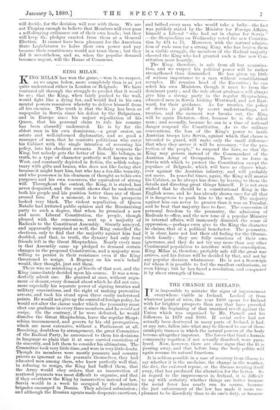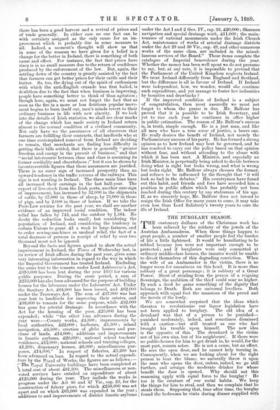THE CHANGE IN IRELAND.
T is impossible to mistake the signs of improvement everywhere visible in Ireland. Looked at from whatever point of view, the year 1889 opens for Ireland with far brighter prospects than any that have preceded it since the beginning of that unarmed revolt against the Union which was organised by Mr. Parnell and his followers in 1879 and 1880. If social order had not actually been destroyed in many parts of Ireland, it had, at any rate, fallen into what may be likened to one of those cataleptic trances in which the natural powers of the body become altogether impotent. The forces that bind a human community together. if not actually dissolved, were para- lysed. Now, however, there are clear signs that the fit is passing away, and that before long the body politic will again resume its natural functions.
It is seldom possible in a case of recovery from illness, to say whether it is the medicine, the change in the weather, the diet, the enforced repose, or the disease wearing itself away, that has produced the alteration for the better. So in regard to the improvement in Ireland, it is difficult to say with certainty whether things are better because the social fever has nearly run its course, because the just enforcement of the law has made it more un- pleasant to be disorderly than to do one's duty, or because there has been a good harvest and a revival of prices and of trade generally. In either case no one fact can be with certainty assigned as the only cause for an im- provement which is probably due in some measure to all. Indeed, a moment's thought will show us that in some of the reasons we have given for a belief in a change for the better in Ireland, there is something of both cause and effect. For instance, the fact that prices have risen is in no small measure due to the return of confidence produced by the enforcement of the law. But, again, the settling down of the country is greatly assisted by the fact that farmers can get better prices for their cattle and their butter. So, too, the dying out of the spirit of enthusiasm with which the anti-English crusade was first hailed, is doubtless due to the fact that when business is improving, people have something better to think of than agitation ; though here, again, we must not forget the fact that as soon as the fire in a more or less fictitious popular move- ment begins to burn itself out, men's minds revert to their ordinary business in life with new alacrity. If we look into the details of Irish statistics, we shall see clear marks of the change which has made society in Ireland return almost to the normal condition of a civilised community. Not only have we the assurances of • all observers that farmers are fulfilling their contracts, that landlords who at one time contemplated removal from Ireland are deciding to remain, that merchants are finding less difficulty in getting their bills settled, that there is generally "greater freedom and energy in the pursuit of business," and that "social intercourse between class and class is assuming its former cordiality and cheerfulness ;" but it can be shown by incontrovertible figures that these assurances are justified. There is no surer sign of increased prosperity than an upward tendency in the traffic returns of the railways. This sign is not wanting in Ireland. The three main lines have all increased their earnings in the last half-year. The export of live-stock from the Irish ports, another sure sign of improvement, has increased by 32,000 in the shipments of cattle, by 37,000 in those of sheep, by 73,00 in those of pigs, and by 2,000 in those of horses. If we take the Poor-Law returns for the past year, we shall see another evidence of an improved social condition. The indoor relief has fallen by 743, and the outdoor by 1,564. No doubt the reduction looks small ; but considering the population of Ireland, and considering the tendency in certain Unions to grant £1 a week to large farmers, and to order sewing-machines as medical relief, the fact of a total decrease of persons in receipt of relief by over two thousand must not be ignored. Beyond the facts and figures quoted to show the actual improvement in Ireland, the Times of Wednesday last, in its review of Irish affairs during the past year, gives some very interesting information in regard to the way in which the Imperial Government has treated Ireland. Excluding the sums lent to the tenants under Lord Ashbourne's Act, £610,000 has been lent during the year 1888 for various public purposes. During the same period, a sum of £253,000 has also been advanced for the purpose of building houses for the labourers under the Labourers' Act. Under the Sanitary Act, £64,000 has been issued, and £62,000 under the Tramways Act. The sum of £37,000 was last _year lent to landlords for improving their estates, and £38,000 to tenants for the same purpose, while £32,000 has gone for arterial drainage. In accordance with the Act for the housing of the poor, £20,000 has been expended ; while "the other loan advances during the year were :—County works, £4,800; improvements by local authorities, £22,000; harbours, £5,500; inland navigation, £4,500; erection of glebe houses and pur- chase of lands, £14,000; additions and improvements in lunatic asylums, £20,000; national school teachers' residences, £12,000; national schools and training colleges, £1,200; dispensary houses, £6,000; miscellaneous pur- poses, £14,000." In respect of fisheries, £5,200 has -been advanced on loan. In regard to the actual expendi- Aure by the Board of Works, the figures are as follows :— 4' The P oyal University buildings have been completed at total cost of about £81,300. The miscellaneous or non- voted services have entailed an expenditure of about £125,000 during the year. They include the works in progress under the Act 46 and 47 Vic., cap. 26, for the construction of fishery piers, for which £250,000 was set apart and on which £63,000 was expended in the year ; additions to and improvements of district lunatic asylums under the Act 1 and 2 Geo. IV., cap. 33, £20,000; Shannon navigation and special drainage work, £11,000; the main- tenance of national monuments under the .Irish Church Act, maintenance of works of arterial drainage districts under the Act 29 and 30 Vic., cap. 49, and other numerous works of the same class, are included in the miscel- laneous services of the Board." These items complete the catalogue of Imperial benevolence during the year. Whether the money has been well spent we do not presume to say, but, at any rate, it is impossible to pretend that the Parliament of the United Kingdom neglects Ireland. We treat Ireland differently from England and Scotland, but the difference is all in favour of Ireland. If Ireland were independent, how, we wonder, would she continue such expenditure, and yet manage to foster her industries by bounties and drawbacks ?
If the improved condition of Ireland is a subject of congratulation, then most assuredly we must not forget to whom the praise is due. Mr. Balfour has proved that it is possible to be Irish Secretary, and yet to rise each year he continues in office higher in public estimation. The reason of Mr. Balfour's success is, in truth, simple enough. He is a just man, and like all men who have a true sense of justice, a brave one. He really desires the benefit of Ireland, not merely the Parliamentary success of his party. He has formed a strong opinion as to how Ireland may best be governed, and he has resolved to carry out the policy based on that opinion without fear, and without attending to the abuse with which it has been met. A Minister, and especially an Irish Minister, is perpetually being asked to decide between doing what is right but looks wrong, and what is wrong but looks right. Mr. Balfour always chooses the former, and refuses to be influenced by the thought that "it will look so bad in the debates." His countrymen have found out this habit, and friends and foes have accorded him a position in public affairs which has probably not been reached during this century by any statesman of his age. If, as we sincerely hope, Mr. Balfour does not intend to resign the Irish Office for many years to come, it may take even less than Lord Salisbury's twenty years to cure the ills of Ireland.















































 Previous page
Previous page